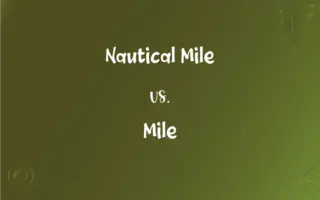Spiders vs. Insects: What's the Difference?
Edited by Aimie Carlson || By Janet White || Published on January 7, 2024
Spiders are arachnids with eight legs and no wings or antennae, whereas insects are characterized by six legs, wings, and antennae.

Key Differences
Spiders, belonging to the class Arachnida, have eight legs and two body segments. Insects, classified under the class Insecta, typically have six legs and three body segments.
Spiders do not have wings or antennae, features commonly found in insects. Insects usually have one or two pairs of wings and a pair of antennae.
In spider anatomy, the two body parts are the cephalothorax and abdomen. Insect bodies consist of the head, thorax, and abdomen.
Spiders often have silk-producing abilities used for web-building. Insects display a wide range of behaviors but do not produce silk for webs.
Spiders typically have simple eyes, whereas insects often possess compound eyes with multiple lenses.
ADVERTISEMENT
Comparison Chart
Number of Legs
Eight
Six
Body Segments
Two (Cephalothorax, Abdomen)
Three (Head, Thorax, Abdomen)
Wings and Antennae
No wings or antennae
Wings and antennae present
Silk Production
Often produce silk for webs
Do not produce silk for webs
Eye Type
Simple eyes
Often compound eyes
ADVERTISEMENT
Spiders and Insects Definitions
Spiders
Spiders have two main body parts and lack wings.
Spiders' unique body structure differentiates them from insects.
Insects
Insects are six-legged creatures with three body segments.
Bees, as insects, have a distinct head, thorax, and abdomen.
Spiders
Many spiders have venom used for subduing prey.
The venom of a black widow spider can be harmful to humans.
Insects
Insects are the largest group of animals on Earth.
Insects like beetles are found in almost every environment.
Spiders
Spiders are eight-legged arachnids known for web-building.
The garden spider spins intricate webs to catch prey.
Insects
Insects undergo various forms of metamorphosis.
A caterpillar transforms into a butterfly through metamorphosis.
Spiders
Spiders play a crucial role in controlling insect populations.
Spiders in gardens help reduce the number of harmful insects.
Insects
Most insects have wings and antennae.
Butterflies use their wings for migration over long distances.
Spiders
Spiders are found worldwide in diverse habitats.
Spiders adapt to environments ranging from deserts to rainforests.
Insects
Many insects play key roles in pollination and decomposition.
Bees are essential for the pollination of many flowering plants.
Spiders
Any of numerous arachnids of the order Araneae, having a body divided into a cephalothorax and an abdomen, eight legs, two chelicerae that bear venom glands, and two or more spinnerets that produce the silk used to make nests, cocoons, or webs for trapping insects.
Insects
Any of numerous arthropod animals of the class Insecta, having an adult stage characterized by three pairs of legs and a body segmented into head, thorax, and abdomen and usually having one or two pairs of wings. Insects include the flies, crickets, mosquitoes, beetles, butterflies, and bees.
Spiders
One that resembles a spider, as in appearance, character, or movement.
Insects
Any of various other small, chiefly arthropod animals, such as spiders, centipedes, or ticks, usually having many legs. Not in scientific use.
Spiders
A program that automatically retrieves webpages and follows the links on them to retrieve more webpages. Spiders are used by search engines to retrieve publicly accessible webpages for indexing, and they can also be used to check for links to webpages that no longer exist. Also called crawler, search bot.
Insects
An insignificant or contemptible person.
Spiders
New England, Upper Northern, & South Atlantic US See frying pan.
Insects
Plural of insect
Spiders
A trivet.
Spiders
Plural of spider
Spiders
Infl of spider
FAQs
How many legs do spiders have?
Spiders have eight legs.
Do insects have antennae?
Yes, most insects have a pair of antennae.
What are the body segments of insects?
Insects have three body segments: the head, thorax, and abdomen.
Are there winged spiders?
No, spiders do not have wings.
Can insects produce silk?
Some insects like silkworms produce silk, but it's not used for webs.
What types of eyes do spiders have?
Spiders typically have simple eyes.
Do all spiders produce silk?
Most spiders produce silk, though not all use it for web-building.
Are spiders insects?
No, spiders are arachnids, not insects.
How do spiders and insects differ in reproduction?
Their reproductive methods vary, with insects often laying eggs and spiders having diverse reproductive strategies.
What is the role of insects in ecosystems?
Insects play crucial roles in pollination, decomposition, and as food sources.
Do insects have a role in pest control?
Yes, some insects are natural predators of pest species.
Are all spiders venomous?
Many spiders have venom, but not all are harmful to humans.
How do spiders catch their prey?
Many spiders use webs to catch prey, while others hunt actively.
Are all insects beneficial?
While many are beneficial, some insects are considered pests.
How diverse are spider species?
There are over 45,000 known species of spiders.
Are insects important for agriculture?
Yes, insects like bees are vital for crop pollination.
How many species of insects exist?
There are over a million described species of insects.
Do spiders undergo metamorphosis?
No, spiders do not undergo metamorphosis like many insects.
Can spiders be found in urban areas?
Spiders adapt well to urban environments and can be commonly found.
Do spiders live in colonies?
Most spiders are solitary, but some species live in communal webs.
About Author
Written by
Janet WhiteJanet White has been an esteemed writer and blogger for Difference Wiki. Holding a Master's degree in Science and Medical Journalism from the prestigious Boston University, she has consistently demonstrated her expertise and passion for her field. When she's not immersed in her work, Janet relishes her time exercising, delving into a good book, and cherishing moments with friends and family.
Edited by
Aimie CarlsonAimie Carlson, holding a master's degree in English literature, is a fervent English language enthusiast. She lends her writing talents to Difference Wiki, a prominent website that specializes in comparisons, offering readers insightful analyses that both captivate and inform.






































































